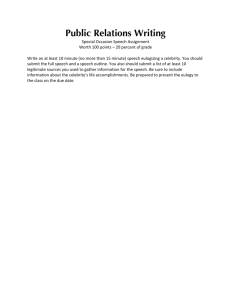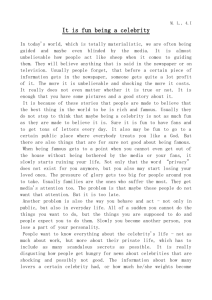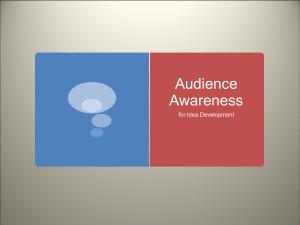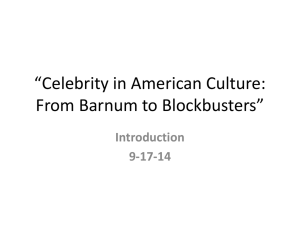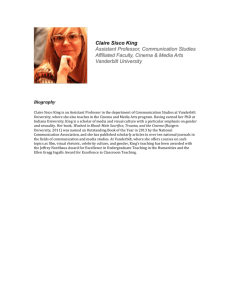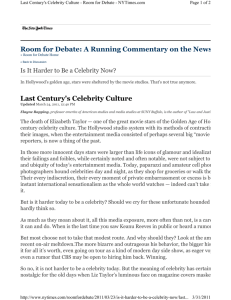Newsletter for the Members of the AMA Global Marketing Special
advertisement
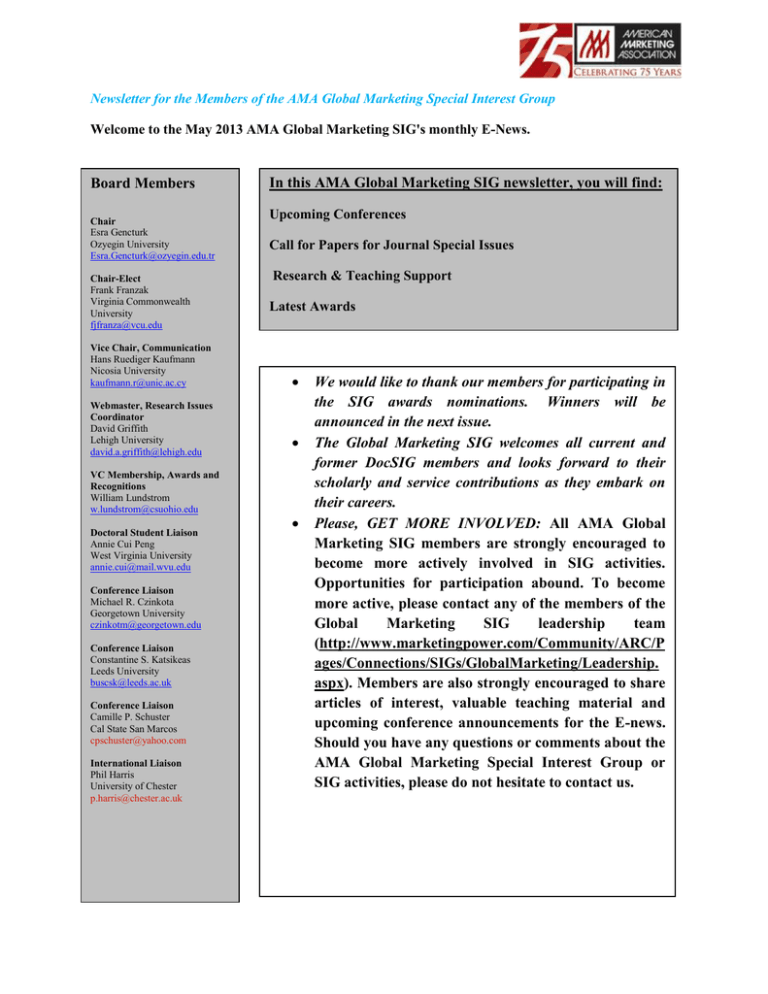
Newsletter for the Members of the AMA Global Marketing Special Interest Group Welcome to the May 2013 AMA Global Marketing SIG's monthly E-News. Board Members Chair Esra Gencturk Ozyegin University Esra.Gencturk@ozyegin.edu.tr Chair-Elect Frank Franzak Virginia Commonwealth University fjfranza@vcu.edu Vice Chair, Communication Hans Ruediger Kaufmann Nicosia University kaufmann.r@unic.ac.cy Webmaster, Research Issues Coordinator David Griffith Lehigh University david.a.griffith@lehigh.edu VC Membership, Awards and Recognitions William Lundstrom w.lundstrom@csuohio.edu Doctoral Student Liaison Annie Cui Peng West Virginia University annie.cui@mail.wvu.edu Conference Liaison Michael R. Czinkota Georgetown University czinkotm@georgetown.edu Conference Liaison Constantine S. Katsikeas Leeds University buscsk@leeds.ac.uk Conference Liaison Camille P. Schuster Cal State San Marcos cpschuster@yahoo.com International Liaison Phil Harris University of Chester p.harris@chester.ac.uk In this AMA Global Marketing SIG newsletter, you will find: Upcoming Conferences Call for Papers for Journal Special Issues Research & Teaching Support Latest Awards We would like to thank our members for participating in the SIG awards nominations. Winners will be announced in the next issue. The Global Marketing SIG welcomes all current and former DocSIG members and looks forward to their scholarly and service contributions as they embark on their careers. Please, GET MORE INVOLVED: All AMA Global Marketing SIG members are strongly encouraged to become more actively involved in SIG activities. Opportunities for participation abound. To become more active, please contact any of the members of the Global Marketing SIG leadership team (http://www.marketingpower.com/Community/ARC/P ages/Connections/SIGs/GlobalMarketing/Leadership. aspx). Members are also strongly encouraged to share articles of interest, valuable teaching material and upcoming conference announcements for the E-news. Should you have any questions or comments about the AMA Global Marketing Special Interest Group or SIG activities, please do not hesitate to contact us. Upcoming Conferences Australian & New Zealand Marketing Academy Conference (ANZMAC) 2013 Conference dates and place to be held: Auckland University of Technology, 1st - 4th December, 2013 The ANZMAC 2013 Conference Committee warmly invites submission of competitive papers, special sessions and posters for the 2013 Conference, which will be held at the University of Auckland in Auckland, New Zealand. The conference will be preceded by a Doctoral Colloquium hosted by the Auckland University of Technology. Both venues are within easy walking distance of each other. Under the theme of "Engaging With Our Future", a goal for ANZMAC 2013 is to seek conceptual and/or empirical works that advance and challenge marketing theory and practice. In keeping with our theme, noted Market Researcher, Professor Roland Rust (University of Maryland), will be the conference keynote speaker. Call for papers: Ι. Competitive Papers II. Special Session Proposals III. Poster Abstracts Submission Deadline: Sunday 30 June 2013 Notification of authors: Saturday 31 August 2013 For more information please follow the link below: http://www.anzmac2013.org/ 22nd International Business Research Conference Conference dates and place to be held: Meliá Galgos Hotel, Madrid, Spain, 9 – 10 September, 2013 Research papers in all areas of Accounting, Banking, Economics, Finance, Investment, Management, Marketing and all other business subjects are invited for the above international conference organised by European Centre for Business and Economic Research (ECBER), WBI London, UK, BCA Australia (USA) and World Business Institute, Australia and sponsored by eight international peer reviewed Cabell’s listed journals. Call for papers: Ι. Full Papers II. Abstracts Submission deadline: 29 July 2013 For more information please follow the link below: www.worldbusres.com XXII International Conference of the European Academy of Management and Business Economics (AEDEM) “Innovation and Entrepreneurship as Drivers for the Global Economy” Conference dates and place to be held: Aalen University, Germany, September 2-3, 2013 We would like to invite you to the XXII International Conference of the European Academy of Management and Business Economics (AEDEM), which will take place in Aalen 2 and 3 September, 2013. The conference will be held under the theme, Innovation and Entrepreneurship as Drivers for the Global Economy. We are happy to announce that this important international conference of management and business economics will take place for the first time in Germany at Aalen University. Aalen University is a globally-aligned and praxis-oriented university with five schools enrolling more than 5,000 students in 40 Bachelor and Master Departments. A particularly important element of the university is the mutual exchange of knowledge and expertise with industry in teaching and research. Indeed Aalen University is the most research oriented among the applied universities in BadenWürttemberg and has long worked with world class cooperation partners such as Carl Zeiss AG or Robert Bosch GmbH. Call for papers: Ι. Full Papers Submission deadline: 19 July 2013 For more information please follow the link below: http://www.aedem-virtual.com/en/congresses/international/1958/innovation-and-entrepreneurshipdrivers-global-economy Call for Papers for Journal Special Issues Arts Marketing: An International Journal General Call for Papers Editor in Chief: Noel Dennis The Editors are currently considering papers for inclusion in Arts Marketing: An International Journal (AM), launching in 2011. The double-blind peer reviewed journal is edited by Noel Dennis, Teesside University, UK; Dr Gretchen Larsen, King's College London, UK; and Professor Michael Macaulay, Teesside University. It is dedicated to publishing high-quality contemporary research into arts marketing and encourages creativity in marketing theory and practice. AM embraces the growing number of talented academics working in the international field of arts marketing; challenging - and building upon - current orthodoxy in this area. This includes all sectors of the creative industries such as visual arts and crafts, museums, performing arts, music, film, cinema and literature. Coverage includes, but is not limited to: • Marketing and consumption of all art forms regardless of their conventional categorization (e.g. ‘for’ and ‘not for profit’; high art and popular culture) • All sectors of the cultural and creative industries such as visual arts and crafts, museums, performing arts, music, film, cinema, literature • Interdisciplinary approaches to arts and marketing (e.g. sociology, psychology, anthropology, economics, commerce, technology, history, geography, philosophy) • International issues in the arts (e.g. comparative research into support/management of the arts relationship between media technologies, society and the individual) • Cutting edge and emerging research in arts marketing (e.g. the social construction of arts experiences; performing identity: artist and audiences; ethics and consumer empowerment in the arts). Submission: Submissions should be made using ScholarOne Manuscripts, the online submission and peer review system, at http://mc.manuscriptcentral.com/am Articles should be supplied in Word format. All authors' details must be printed on a separate sheet and authors should not be identified anywhere else in the article. Submissions will be "concise-paper" articles of around 2000 - 6000 words. A title of no more than eight words should be provided. Comprehensive author guidelines can be found at: www.emeraldinsight.com/am.htm For more information please follow the link below: http://www.academyofmarketing.org/calls-for-papers-publications/arts-marketing-an-internationaljournal.html International Marketing Review Special Issue on Multicultural marketplaces: new territory for international marketing and crosscultural consumer research Guest Co-Editors: Catherine Demangeot, Amanda J. Broderick and C. Samuel Cra Many marketplaces the world over host natives, residents and visitors from many nationalities and cultures. Breaking out of their own geographies, these marketplaces are becoming more like one another across national boundaries than like other, more homogeneous parts of the countries in which they are located. If one considers the market actors, the products, services and practices that are available, and the general consumption environments, Sydney, New York City, Cairo, London, Manchester, Moscow, Dubai, Shanghai, or Toronto have more in common with one another than with the more culturally homogeneous marketplaces within their geographical environment. Besides, many virtual marketplaces are ''born multicultural''. In a world where the top 100 cities account for close to 950 million inhabitants (Brinkhoff, 2012) and rising, these multicultural marketplaces have a large economic impact. Recent practitioner advice (Dobbs et al., 2012) recommends that companies focus their strategies, in emerging markets, on cities rather than countries or regions, citing the benefits of dis-aggregating marketplaces for strategic advantage. Yet, the literature on international marketing and cross-cultural consumer research has for the most part assumed culturally homogeneous national or regional markets, focusing instead on comparisons and differences between cultures separated by borders. Such approaches have enabled marketers to sharpen their approach by tailoring strategies to the characteristics of particular markets, but they are insufficient to understand the phenomena that take place in multicultural marketplaces and identify the strategies best suited to these marketplaces. Similar concerns about a lack of conceptualisation of multicultural work – and business places have been raised in the management literature (e.g. McSweeney, 2009; Tung, 2008; Witte, 2012). A stream of marketing literature has begun to consider the cultural and market transformations caused by the flows of people, ideas, media, finance and technologies (Appadurai, 1990) in such marketplaces, and their implications on firm behaviour. Several scholars (Briley, 2009; Cadogan et al., 2006; Craig and Douglas, 2006; Leung et al., 2005; Nakata, 2009; Yaprak, 2008) have called for more research in this area. Of particular note is the work by Samuel Craig and Susan Douglas in the pages of this journal (Craig and Douglas, 2006; Douglas and Craig, 2011), that called for closer consideration of the impact of contextual factors on consumption behaviour and research into the consequences of new cultural dynamics taking place in societies where the boundaries between cultures are becoming increasingly porous. The purpose of this special issue, in commemorating the pioneering work of Susan Douglas in international marketing, is to further establish a stream of literature that deals with the new consumption and marketing dynamics emerging in multicultural marketplaces. Papers are invited from all research traditions that aim to enhance our conceptual understanding of the new 'territories' that are multicultural marketplaces. The following are suggested areas of particular interest; however they are not exhaustive. Consumers, consumption behaviours: vulnerability, empowerment, aesthetics Marketing practice and policy Marketplace, environmental and economic dynamics All submissions will be reviewed in accordance with the reviewing process guidelines outlined in the Notes for Contributors on the International Marketing Review home page. The contribution of the paper should be clearly stated in the structured abstract and should be in accordance with the special issue theme. Deadline for submission: The closing date for submission is 31 January 2014. For more information please follow the link below: http://www.academyofmarketing.org/calls-for-papers-publications/international-marketing-review.html Journal of Marketing Management Special Issue on Celebrity Convergence & Transformation Guest Editors: Dr Paul Hewer, University of Strathclyde; Professor Douglas Brownlie, University of Stirling; Dr Finola Kerrigan, King’s College London. This special issue seeks to invigorate the turn to identity work as market practice through mobilising interpenetrating discourses of celebrity, media brands and convergence culture (Jenkins, 2006). We invite papers which seek to push and contest contemporary understandings of celebrity within marketing beyond the staple repertoire of celebrity endorsement and brand positioning (Erdogan, 1999; Keller, 2008). We encourage papers which problematize celebrity and its various technologies of glamour and affect, to theorize celebrities as market making and shaping devices. For as Marketing Week no less recently proclaimed: “The old model of celebrity endorsement is dead.” (Chahal, 2013). The media spectacle of celebrity and its seductive performativity makes for compulsion, captivation and fascination. Celebrity culture materializes and reorganizes mediatized markets and populates the lifeworld with social objects of adoration and worship, energizing the libidinal economy. When it comes to making capital out of culture, the cultural figure of the celebrity media brand is a vital constituent in the on-going reinvention of global capitalism (Lash & Lury, 2007): think Warhol (Kerrigan, Brownlie, Hewer & DazaLeTouze, 2011); think Nigella (Brownlie & Hewer, 2009; 2011); think Angelina Jolie, Aishwarya Rai, Lady Gaga, Oprah, Sammi Cheng or Gatsby, all media commodities among other commodities in the media environment. Celebrity culture fashions and refashions news. As market actors (Araujo et al., 2010; Geiger & Finch, 2009) celebrities remediatize markets and market practices through identity politics and the social media platforms of convergence and participation they enliven. For as Kermit the Frog extolled: “What's so amazing that keeps us Star gazing. What do we think we might see?”. Mole (2008) in writing of the formation of Lord Byron’s branded persona speaks of such celebrity apparatus as cultural work, where the (brand) name, becomes a “guarantor of certain marketable qualities and connotations” (2008, p.351): a commercial and cultural asset in other words, through which markets and market practice are remade and transformed. We invite contributions which share our fascination with unpacking celebrity and its multiple forms of appeal and attraction. Themes which we offer, as points of contribution include: • Unpacking Celebrity Brands • Ingredients and Provocations; Slogans and Credos of Celebrity Brands • Celebrities and Participatory Culture • Social Media and Celebrity • How Celebrities become Icons • Gender and Celebrity Culture • Practices of Celebrity Advocacy/Activism • Producing Celebrity • Neoliberalism and Celebrity Culture • Technologies of glamour and affect • • • • • Celebrity, Luxury and Austerity Celebrity as performative text Celebrity and mythmaking Consuming Celebrity Historical and Institutional approaches to Celebrity All manuscripts submitted must strictly follow the guidelines for the Journal of Marketing Management. These are available at www.tandfonline.co.uk/rjmm. Deadline for Submission: Friday 31st January 2014 For more information please follow the link below: http://www.academyofmarketing.org/calls-for-papers-publications/journal-of-marketingmanagement.html Research & Teaching Support (Articles and Case Studies) The following articles might be useful to be used in your lecture: Transferring the Retail Format Successfully into Foreign Countries Bernhard Swoboda, Stefan Elsner (2013), Journal of International Marketing: Vol. 21, No. 1, pp. 81-109. Abstract Research shows that most retailers expand abroad by transferring some elements of their format, and therefore their value chain, unchanged, while adapting other elements. However, little is known about how strongly a retail format's standardized or adapted elements affect performance in a foreign country. To shed light on this issue, this study focuses on the design of important processes and offerings, as both determine retailers' efficiency and sales. This study proposes that successful retailers build on the unchanged know-how parts of the format by combining more standardized core elements with adapted peripheral elements. The authors draw from a survey of 102 international retailers and interviews with 126 executives conducted at their headquarters. The results show that retailers transfer offers (marketing programs) and processes (marketing and supply chain) differently and hierarchically; that is, peripheral elements are allowed to vary, whereas core elements are transferred in a more standardized manner. Furthermore, the relationship between marketing program elements and performance varies: the use of standardized core elements (e.g., store types, locations) and adapted peripheral elements (e.g., assortments, promotions) is advisable for increasing performance in another country. Processes are only indirectly associated with performance. These observations hold true for both psychically close and distant countries. Read More: http://www.journals.marketingpower.com/doi/abs/10.1509/jim.12.0148 Portfolio Dynamics and Alliance Termination: The Contingent Role of Resource Dissimilarity Anna S. Cui (2013), Journal of Marketing: Vol. 77, No. 3, pp. 15-32. Abstract This article takes a portfolio approach to examine how an alliance's propensity of termination is influenced by its resource relationships with other alliances of the firm. Whereas previous research has suggested that similar partner resources in a portfolio create redundancy and that dissimilar resources are beneficial, this study argues that redundancy may be necessary to ensure stable access to resources and that synergies from dissimilar resources may be difficult to realize. Thus, under some conditions, resource dissimilarity may be less supportive of, or even detrimental to, the continuity of an alliance. The author identifies several conditional factors that change the role of resource dissimilarity. While relational connectedness between the focal partner and other partners of the firm is found to strengthen the supporting effect of resource dissimilarity on alliance continuity, vertical connectedness of alliance activities, formation of substituting alliances by the focal partner, and market uncertainty weaken the supporting effect of resource dissimilarity. The findings reveal alliance termination factors beyond dyadic interactions and provide important implications for managing interdep g effect of resource dissimilarity on alliance continuity, vertical connectedness of alliance activities, formation of substituting alliances by the focal partner, and market uncertainty weaken the supporting effect of resource dissimilarity. The findings reveal alliance termination factors beyond dyadic interactions and provide important implications for managing interdependencies within an alliance portfolio to enhance alliance stability. Read More: http://www.journals.marketingpower.com/doi/abs/10.1509/jm.11.0164 Consumer-Generated Ads: Does Awareness of Advertising Co-Creation Help or Hurt Persuasion? Debora V. Thompson, Prashant Malaviya (2013), Journal of Marketing: Vol. 77, No. 3, pp. 33-47. Abstract Companies increasingly involve consumers in the process of developing advertising and other marketing actions. An important question that has not been explored is whether brands benefit from communicating to consumers who had not been involved in the co-creation process that a target ad was developed by a fellow consumer. The authors propose a skepticism–identification model of ad creator influence, which hypothesizes that disclosing to an audience that an ad was created by a consumer triggers two opposing effects: skepticism about the competence of the ad creator and identification with the ad creator. Four studies demonstrate that the effectiveness of disclosing advertising co-creation depends on factors that hinder skepticism and heighten identification with the ad creator. Specifically, attributing the ad to a consumer is shown to increase persuasion when the audience (1) has limited cognitive resources to scrutinize the message, (2) is given background information about the ad creator that enhances source similarity, and (3) has high loyalty toward the brand. The implications of these findings on marketing theory and practice are discussed. Read More: http://www.journals.marketingpower.com/doi/abs/10.1509/jm.11.0403 Wish Versus Worry: Ownership Effects on Motivated Judgment Xianchi Dai, Christopher K. Hsee (2013), Journal of Marketing Research: Vol. 50, No. 2, pp. 207-215. Abstract How do consumers' needs and motivations influence their perceptions of external objects? For example, do hungry people perceive a cake to be larger or smaller than do satiated people? According to the New Look psychology literature, the answer is invariably “larger.” However, in this article, the authors demonstrate that the answer is more complex depending on whether the object belongs to the perceiver. If the cake does not belong to the perceiver, she will perceive it to be larger if she is hungry than if she is satiated. In contrast, if the cake already belongs to her, she will perceive it to be smaller if she is hungry than if she is satiated. The authors propose a two-process (wishful thinking vs. worryful thinking) hypothesis to explain the finding and discuss its theoretical and marketing implications. Read More: http://www.journals.marketingpower.com/doi/abs/10.1509/jmr.11.0189 Marketing Awards 2012 Sheth Foundation/Journal of Marketing Award Peter C. Verhoef is the recipient of the 2012 Sheth Foundation/Journal of Marketing Award for his article, “Understanding the Effect of Customer Relationship Management Efforts on Customer Retention and Customer Share Development,” which appeared in the October 2003 (Vol. 67, No. 4) issue of the Journal of Marketing (JM). The award is administered through the American Marketing Association Foundation. Nominations for the award were solicited from members of the JM Editorial Review Board, and a committee of former journal editors—Roland T. Rust (chair), Ruth N. Bolton, and David W. Stewart —made the selection. The award is given to honor articles that have made long-term contributions to the discipline of marketing. The award recognizes scholarship based on the benefits of time and hindsight and acknowledges contributions and outcomes made to marketing theory and practice. This year, the committee considered all articles published in JM between 2003 and 2007. The committee also weighed information obtained from nomination letters and citation analyses. The Sheth Foundation/Journal of Marketing Award was established through the generosity of the Sheth Foundation. The criteria for selection include the quality of the article’s contribution to theory and practice, the article’s originality, its technical competence, and its impact on the field of marketing. Articles eligible for the award must have been published between six and ten years previously. As a nomination letter noted, Verhoef’s article “constitutes a basis for many papers that have been published after 2003” in the area of CRM. Marketing managers and academics have sought a better understanding of the factors influencing "share of customer" or "share of wallet" over time. However, this research problem has been very difficult to investigate for theoretical and technical reasons. The factors influencing share of customer are different from the factors influencing customer retention but this problem had been given insufficient theoretical attention. The article tackled a topic that is difficult from both a conceptual and empirical perspective, and is an exemplar of well-designed and well-executed empirical research. To quote a nominator, “the paper is highly relevant and frequently used by practitioners,” and “has been written in a style which stimulates practitioners to implement ideas and outcomes.” The committee believed that the significant impact of the article on both scholarly research and marketing practice made it a worthy selection for the Sheth Foundation/Journal of Marketing Award. The award is presented annually at the American Marketing Association’s Summer Marketing Educators Conference. Peter C. Verhoef is Professor of Marketing at the Department of Marketing, Faculty of Economics and Business, University of Groningen, the Netherlands. He is also Research Professor in Marketing, BI Norwegian School of Business, Oslo, Norway. For more information, please follow the link below: http://www.marketingpower.com/AboutAMA/Pages/AMA%20Publications/AMA%20Journals/Journal% 20of%20Marketing/JournalofMarketingAwards.aspx 4 Under 40: Emerging Leaders Award The AMA Emerging Leaders Award honors individuals who have already made significant contributions to the field of marketing and its sub-fields, and have demonstrated leadership and continuing service. The program is highly selective, with 4 individuals selected annually. Successful candidates: Have consistently demonstrated a commitment to their industry, and the advancement of Marketing in general or any sub-field (e.g., advertising; analytics; brand; channels; digital; insights; etc.). Are passionate leaders who have a high potential for collaboration and success, including leading by example, mentoring, transferring knowledge, taking a risk to achieve a desired outcome and motivating others. Are under 40 years of age at time of nomination. Congratulations to the 2012 Recipients: AMA TV: 4 Under 40 - Click to watch Phil Berry, President, Jibunu Tom Ewing, Digital Culture Officer, BrainJuicer Melissa Hobley, CMO, Buyology Alec Maki, Vice President of BehaviorLens™ Research, InsightsNow For more information, please follow the link below: http://www.marketingpower.com/Calendar/Pages/4Under40EmergingLeadersAward.aspx Emerald Literati Network -2013 Awards for Excellence For: Hans Ruediger Kaufmann, Demetris Vrontis, Michael Czinkota and Alvin Hadiono Every year Emerald invites each journal’s Editorial Team to nominate what they believe has been that title’s Outstanding Paper and up to three Highly Commended Papers from the previous year (2012). The paper entitled “Corporate branding and transformational leadership in turbulent times” published in Journal of Product & Brand Management has been chosen as an Outstanding Paper Award Winner at the Literati Network Awards for Excellence 2013. The award winning papers are chosen following consultation amongst the journal’s Editorial Team, many of whom are eminent academics or practitioners. Your paper has been selected as it was one of the most impressive pieces of work the team has seen throughout 2012. Further information regarding the Awards for Excellence can be found at the following site: www.emeraldinsight.com/literati AMA GLOBAL MARKETING SIG WEBSITE The Global Marketing SIG website is live at: http://www.lehigh.edu/~inamasig/. Please, contact: Hans Ruediger (Rudi) Kaufmann Kaufmann.r@unic.ac.cy Tel: 00357- 22841643 Skype: Kaufmann2307 Global Marketing Like Never Before
